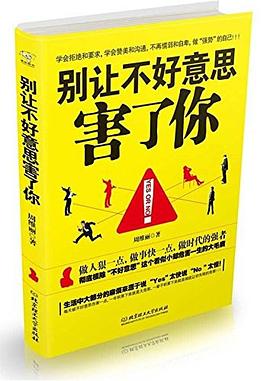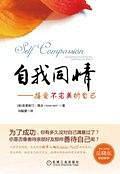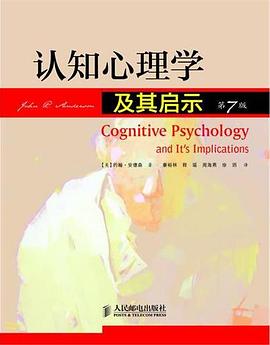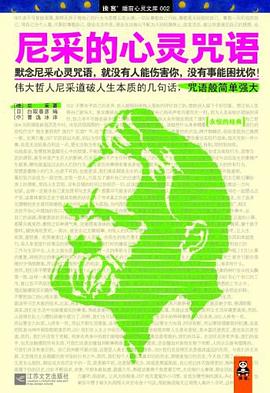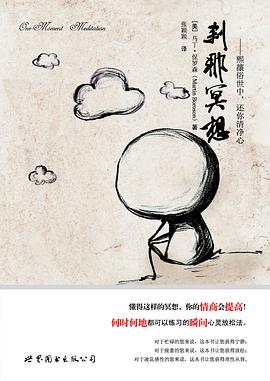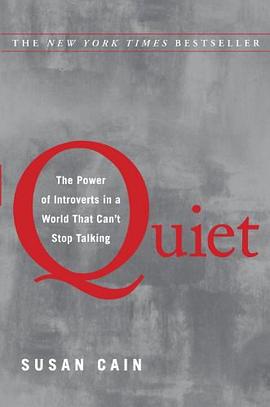

具體描述
At least one-third of the people we know are introverts. They are the ones who prefer listening to speaking, reading to partying; who innovate and create but dislike self-promotion; who favor working on their own over brainstorming in teams. Although they are often labeled "quiet," it is to introverts that we owe many of the great contributions to society--from van Gogh’s sunflowers to the invention of the personal computer.
Passionately argued, impressively researched, and filled with indelible stories of real people, Quiet shows how dramatically we undervalue introverts, and how much we lose in doing so. Taking the reader on a journey from Dale Carnegie’s birthplace to Harvard Business School, from a Tony Robbins seminar to an evangelical megachurch, Susan Cain charts the rise of the Extrovert Ideal in the twentieth century and explores its far-reaching effects. She talks to Asian-American students who feel alienated from the brash, backslapping atmosphere of American schools. She questions the dominant values of American business culture, where forced collaboration can stand in the way of innovation, and where the leadership potential of introverts is often overlooked. And she draws on cutting-edge research in psychology and neuroscience to reveal the surprising differences between extroverts and introverts.
Perhaps most inspiring, she introduces us to successful introverts--from a witty, high-octane public speaker who recharges in solitude after his talks, to a record-breaking salesman who quietly taps into the power of questions. Finally, she offers invaluable advice on everything from how to better negotiate differences in introvert-extrovert relationships to how to empower an introverted child to when it makes sense to be a "pretend extrovert."
This extraordinary book has the power to permanently change how we see introverts and, equally important, how introverts see themselves.
著者簡介
SUSAN CAIN is a consultant to major corporations and law firms on negotiation strategies and personal presentation style. She lives in the Hudson River Valley with her husband and two sons. Visit her website, ThePowerofIntroverts.com.
圖書目錄
Introduction: The North and South of Temperament 15
Part 1 The Extrovert Ideal
1 The Rise of the "Mighty Likeable Fellow": How Extroversion Became the Cultural Ideal 43
2 The Myth of Charismatic Leadership: The Culture of Personality, a Hundred Years Later 67
3 When Collaboration Kills Creativity: The Rise of the New Groupthink and the Power of Working Alone 128
Part 2 Your Biology, Your Self?
4 Is Temperament Destiny?: Nature, Nurture, and the Orchid Hypothesis 171
5 Beyond Temperament: The Role of Free Will (and the Secret of Public Speaking for Introverts) 200
6 "Franklin was a Politician, But Eleanor Spoke Out of Conscience": Why Cool is Overrated 225
7 Why Did Wall Street Crash and Warren Buffett Prosper?: How Introverts and Extroverts Think (and Process Dopamine) Differently 266
Part 3 Do All Cultures Have an Extrovert Ideal?
8 Soft Power: Asian-Americans and the Extrovert Ideal 307
Part 4 How to Love, How to Work
9 When Should You Act More Extroverted Than You Really Are? 347
10 The Communication Gap: How to Talk to Members of the Opposite Type 379
11 On Cobblers and Generals: How to Cultivate Quiet Kids in a World That Can't Hear Them 408
Conclusion: Wonderland 447
A Note on the Dedication 452
A Note on the Words Introvert and Extrovert 455
Acknowledgments 459
Notes 465
· · · · · · (收起)
讀後感
这本书,已经看得我晕头转向,基本上,不断地被作者搞二乎。其中不乏一些有意思的信息,比如对新生儿sensitivity(对外界敏感度)的观察,与日后内向外向的对比。比如,提到一个试验让high sensitivity的人和low sensitivity的人选耳机音量的对比和同时观测脑内被激活的程度 (...
評分上级推荐我读这本书。我一看书名——《安静-内向性格的竞争力》,警惕与羞愧立马竖起。 为何不认同别人说我“内向”?我在书中找到了答案。 内向性格在长期以来的社会观念中是“低劣”的,相对于总能大声发出自己声音的外向性格,它更是没有竞争力的。但实际上喜欢安静独处...
評分引言 南北性格 关键词:估量自己 做你自己 整理: 对于内向的人来说,估量自己是件困难的事情,但是当他们去做的时候却又是很强大的。 内向性格是自己至关重要的一个组成部分,接纳自我也意味着没有必要排斥这种性格,性格是“我是谁”的重要基础。学会欣然接受这种本...
評分1、给内向者的建议:在周末的时候尽量保持自己安静的本性,在工作日里努力“走出自己的世界,流露出混合的性格,跟你的团队和同事联系,调动起你可以控制的一切能量”。(而如果你是个外向的人,你应该让你的周末回归本我变得疯狂起来,上课的时候专注于学业。) 2、你在某些领...
用戶評價
乾瞭這碗雞湯!(然而越讀越緊張)有聲書版也很棒。喜歡看案例的人也沒覺得case太多。作為學術雞湯,讓你不停地對自己的童年唏噓不已……哎
评分Far too many introverts feel the pressure to put on a mask to be extroverts, to fit in, introverts should simply be accepted.
评分可以更瞭解內嚮的人,自己或彆人。
评分Audiobook下載:百度雲網盤。http://site.douban.com/196116/widget/notes/11781049/note/252247479/。再一次讓我確認瞭自己 I am a real introvert。聽得我真是覺得有種“老鄉見老鄉兩眼淚汪汪”的感覺。這世上還有人如此深刻瞭解Introverts 啊!!非常全麵非常深入非常有誠意的一本書。很喜歡。http://book.douban.com/review/6148870/
评分雖然文字和例子可以縮減到2/3厚度,但已屬不易,推薦!
相關圖書
本站所有內容均為互聯網搜索引擎提供的公開搜索信息,本站不存儲任何數據與內容,任何內容與數據均與本站無關,如有需要請聯繫相關搜索引擎包括但不限於百度,google,bing,sogou 等
© 2025 book.quotespace.org All Rights Reserved. 小美書屋 版权所有






